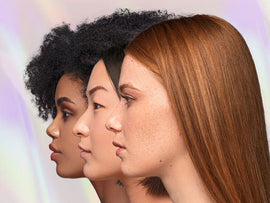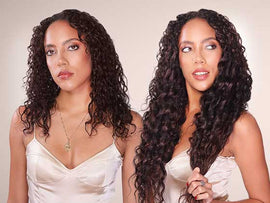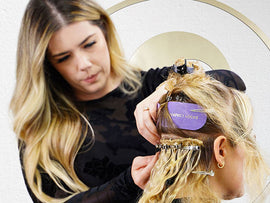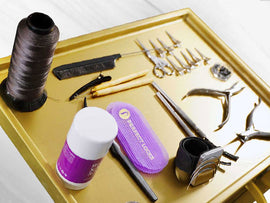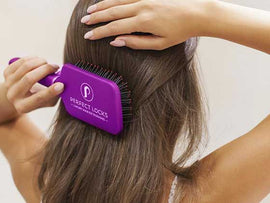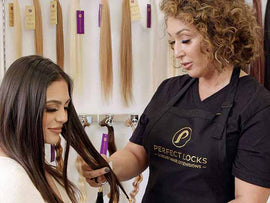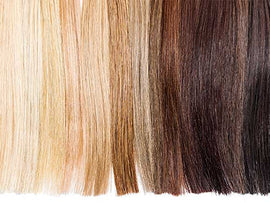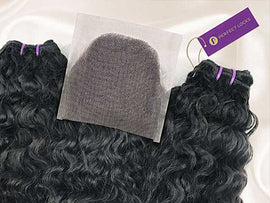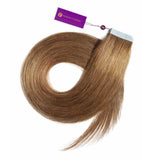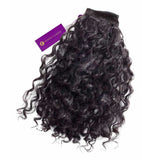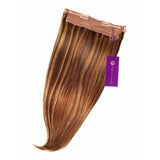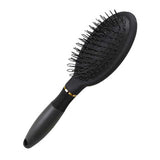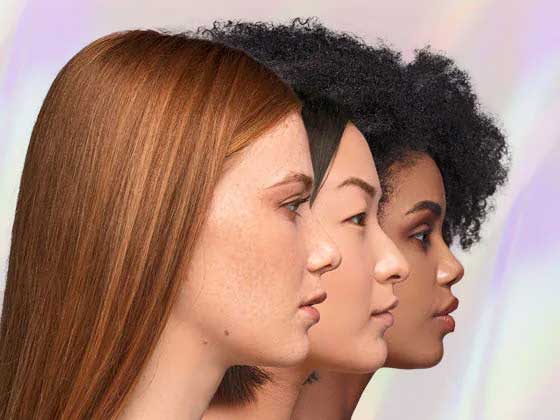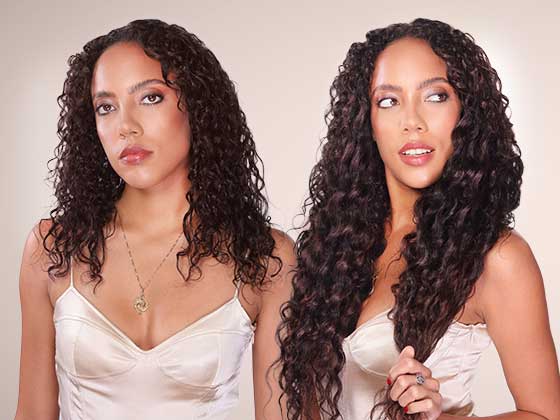Why Ethical Hair Extensions Are Changing the Beauty Industry
Ethically sourced hair extensions ensure that donors are fairly compensated, give their hair willingly, and work under safe conditions - but with a $100 billion global hair industry, how do you know what's truly ethical?
Quick Guide to Ethical Hair Extensions:
- Single-donor hair = traceable, consensual sourcing
- Fair compensation = donors paid living wages
- Temple hair = proceeds fund community programs
- Remy hair = cuticles aligned, longer-lasting
The hair extension industry has a complex history. While some donors use hair sales to fund their children's education, reports also reveal exploitation in certain regions. The Indian human hair market alone generates over $250 million annually, with one temple making £22 million from hair sales in 2015 - funds that feed 30,000 people daily and build schools and hospitals.
Yet the industry remains largely unregulated. Many mainstream extensions use ultra-fine plastic strands that cause discomfort, while others source from questionable supply chains. The key is knowing what to look for.
I'm Priyanka Swamy, founder and CEO of Perfect Locks, and I've spent over 15 years building ethically sourced hair extensions into our core mission after experiencing how difficult it was to find authentic, responsibly sourced hair. Our commitment to ethical sourcing has also driven us to educate countless stylists on identifying and working with ethical suppliers.
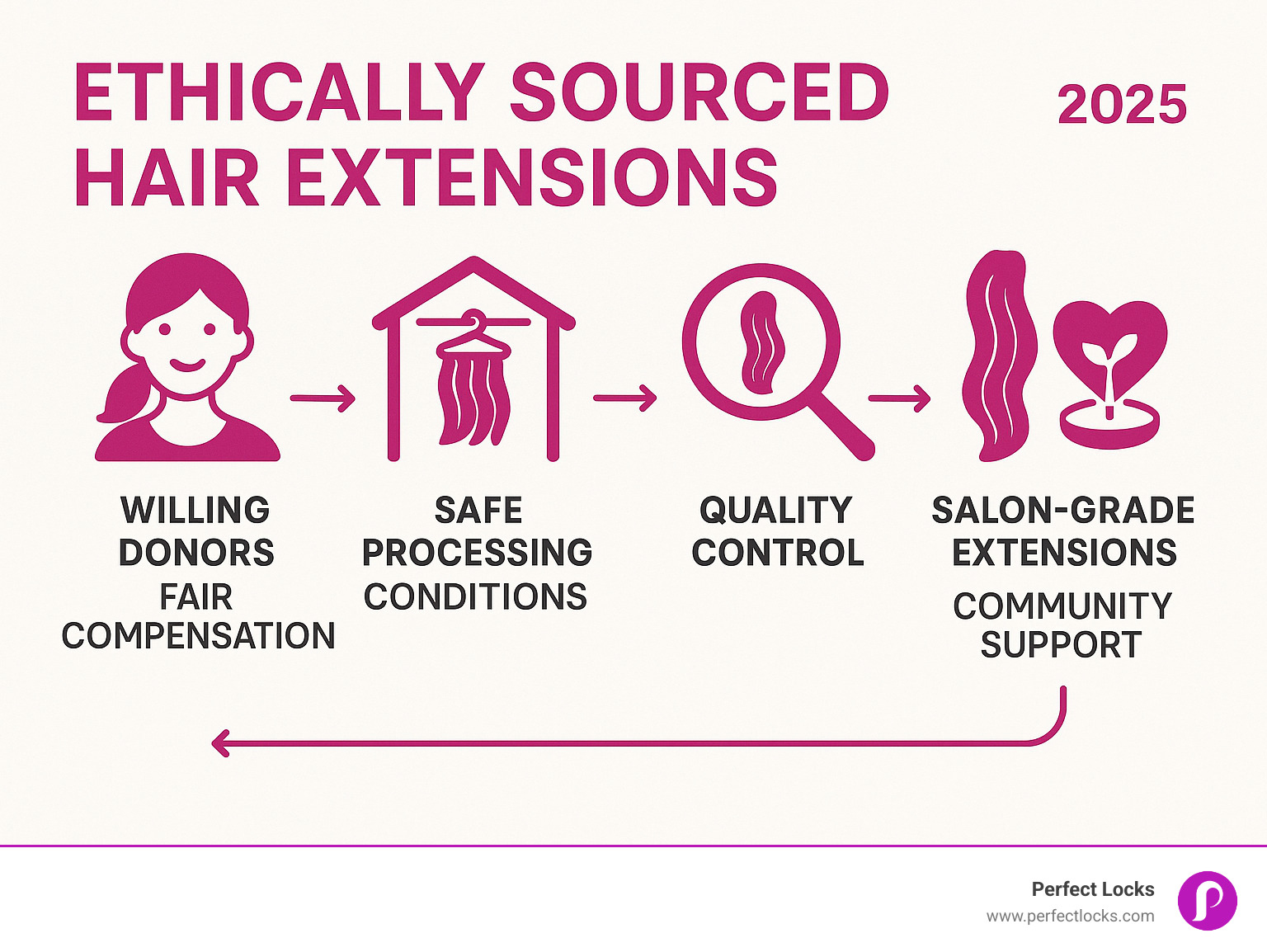
What You'll Learn
In this comprehensive guide, we'll break down exactly what ethical sourcing means, provide a step-by-step checklist, showcase the best ethically sourced products for every style, and share professional care tips that maximize your investment.
Why Ethically Sourced Hair Extensions Matter
The beauty industry has a responsibility problem. With the global hair extension market exploding - the UK alone saw 70% growth in just five years, reaching £45-80 million - some suppliers have prioritized profits over people. But when you choose ethically sourced hair extensions, you're casting a vote for fair wages, genuine donor consent, and community reinvestment.
Here's what separates ethical from exploitative sourcing: compensation, consent, and conditions. Ethical suppliers ensure donors receive fair payment (women in Southeast Asia can earn up to $350 per 100g of hair), give their hair willingly without any pressure, and work in safe, dignified environments. The Importance of Ethically Sourced Hair Extensions shows how these practices create positive changes that ripple through entire communities.
The alternative isn't pretty. Many mainstream synthetic extensions contain ultra-fine strands of plastic that irritate your scalp and pollute our environment. Even worse, some human hair extensions come from suppliers who underpay donors or use questionable collection practices.
How Ethically Sourced Hair Extensions Empower Donors
When done right, selling hair becomes a pathway to financial independence. In rural communities where job opportunities are scarce, hair sales provide crucial income that changes lives. Many donors use these earnings to fund their children's education or start small businesses, breaking cycles of poverty one haircut at a time.
Temple hair programs in India showcase this positive impact beautifully. The revenue doesn't vanish into corporate bank accounts - it directly supports community programs. These temple programs use hair sale proceeds to feed approximately 30,000 people daily, build schools, and construct hospitals.
Environmental Wins of Ethically Sourced Hair Extensions
The planet benefits when you choose human hair over synthetic alternatives. Those plastic-based extensions take hundreds of years to decompose, contributing to microplastic reduction efforts when avoided. Human hair, being completely natural, breaks down harmlessly without leaving toxic residues.
Innovation is pushing boundaries even further. Companies are now focusing on reducing the environmental impact of all hair extension types, including synthetic options, by addressing issues like microplastic reduction.
The circular economy approach makes even more sense with hair extensions. When your extensions reach the end of their life, you can donate them to wig charities or explore options to recycle synthetic bases.
How to Verify Ethical Sourcing Before You Buy
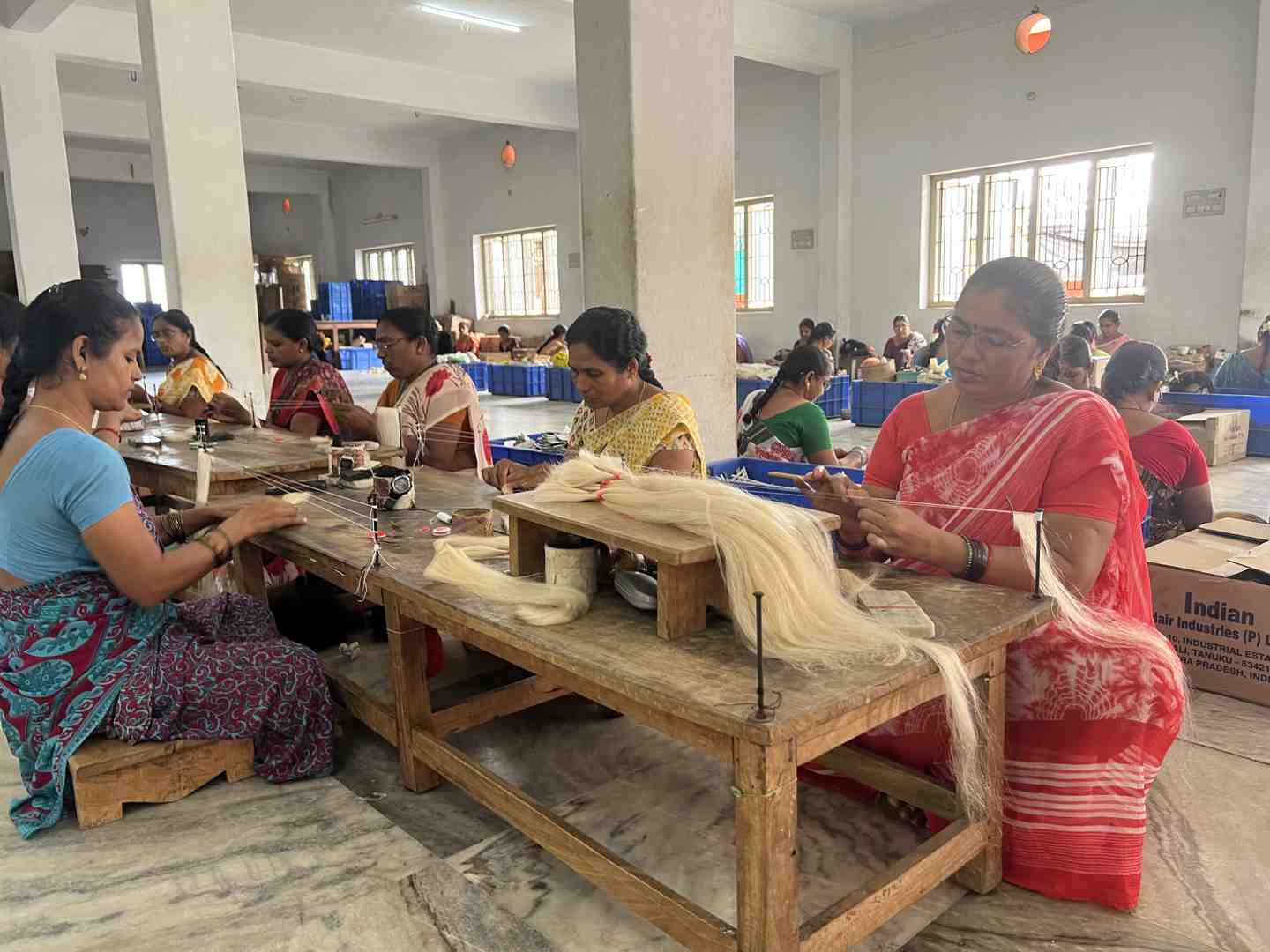
Shopping for ethically sourced hair extensions shouldn't feel like detective work, but the reality is that many brands make bold claims without backing them up. The good news? Once you know what to look for, spotting truly ethical suppliers becomes much easier.
Single-donor traceability is a game-changer in ethical sourcing. When your extensions come from one person's ponytail, rather than a mystery mix of sources, it becomes much simpler to verify that the donor was fairly compensated and gave genuine, informed consent. This direct line of origin provides a clear path to ethical assurance.
What Does Ethically Sourced Mean? breaks down the industry terminology in detail, while resources like this vendor code of conduct show you exactly what comprehensive ethical standards look like in practice.
Quick Consumer Checklist
Before you fall in love with a particular style or price point, ask these essential questions:
Is this hair truly remy? This isn't too much to ask. Reputable suppliers maintain clear records proving the hair's cuticle alignment and single-donor collection.
Is this hair from a single donor or mixed sources? Single-donor hair costs more for good reason - it's more traceable and typically indicates much better ethical practices throughout the supply chain.
Where exactly does this hair originate? Vague answers like "somewhere in Asia" are major red flags. Ethical suppliers know their sources intimately and share specific regions and collection methods.
How do you ensure chemical-free processing? Many suppliers use harsh chemicals that harm both workers and end users. Look for companies that prioritize organic, gentle processing methods.
Here's the hard truth about pricing: if it seems too good to be true, it probably is. Ethically sourced hair extensions involve fair compensation and proper processing, which naturally costs more than exploitative practices.
Reading Labels
Understanding industry terminology helps you cut through marketing fluff and make informed choices. "Remy" hair means all cuticles are aligned in the same direction, which reduces tangling and extends lifespan - but it doesn't automatically indicate ethical sourcing.
"Virgin" hair hasn't been chemically processed, while "single donor" means the hair comes from one person's head rather than being collected from multiple sources. Both are generally positive signs, but you still need to dig deeper into the actual sourcing practices.
Good Karma Hair
Finding the perfect ethically sourced hair extensions means matching your lifestyle with responsible sourcing methods. The beauty of ethical extensions is that there's truly something for everyone - from temple hair that supports community programs to innovative plant-based options that won't harm the planet.
Where Does the Hair Come From? explains how different collection methods affect both the ethics and quality of your extensions. Understanding these differences helps you choose options that align with both your values and your styling needs.
The key is understanding that ethical sourcing doesn't mean compromising on quality. In fact, ethically sourced extensions often last longer because suppliers invest in proper processing and care.
Best for Long-Term Wear: Remy Single Donor Wefts
If you're looking for extensions that truly become part of your everyday routine, Remy single donor wefts are your best friend. These represent the gold standard of ethically sourced hair extensions because they combine superior quality with transparent sourcing practices.
The magic happens in the details. When all cuticles align in the same direction and the hair comes from one person's head, you get extensions that behave exactly like your natural hair. No mysterious tangling at 2 AM, no weird texture changes after washing - just consistent, beautiful hair that moves naturally.
Cuticle alignment is what makes these extensions so special. When they all face the same direction, everything lies smooth and flat. Mix up the directions, and you get a tangled mess. Single-donor sourcing ensures the hair has lived the same life, eaten the same foods, and experienced the same environment, creating consistency you can't get from mixed sources.
The ethical sourcing process involves direct relationships with individual donors who receive fair compensation. Many suppliers maintain detailed records including consent documentation and payment receipts. This transparency means you can feel good about your purchase while enjoying extensions that can be reinstalled multiple times over 18-24 months.
Caring for Your Extensions the Ethical Way
Proper care extends the life of your ethically sourced hair extensions, maximizing both your investment and the positive impact of your purchase. Since these extensions often cost more than conventional alternatives due to fair compensation and ethical processing, taking care of them properly ensures you get full value from your conscious choice.
Extension Care Checklist provides detailed maintenance guidelines, while From Temple to You: The Journey of Your Hair explains why proper care honors the entire supply chain.
Start with sulfate-free cleansing products that won't strip natural oils or damage cuticles. Many ethically sourced extensions undergo minimal chemical processing, making them more sensitive to harsh detergents. Use lukewarm water and gentle, downward motions when washing to maintain cuticle alignment.
Heat styling should be mindful and moderate. While quality Remy hair can handle styling tools, excessive heat damages the cuticle structure and shortens lifespan. Always use heat protectant products and keep temperatures below 350°F when possible.
Everyday Maintenance for Maximum Lifespan
Daily care routines make the biggest difference in extension longevity. Sleep on silk or satin pillowcases to reduce friction and tangling. Before bed, gently brush extensions with a soft bristle brush, working from ends to roots to avoid pulling at attachment points.
Hydration is crucial for maintaining the natural look and feel of human hair extensions. Use leave-in conditioners or light oils to keep hair moisturized, but avoid applying products directly to attachment points where they might cause slipping or buildup.
Regular detangling prevents matting and breakage. Use your fingers or a wide-tooth comb to gently work through tangles, starting at the ends and working upward. Never brush wet extensions aggressively, as this can damage both the hair and attachment methods.
End-of-Life Recycling
When your extensions reach the end of their useful life, responsible disposal continues the ethical cycle. Human hair extensions can be donated to organizations that create wigs for cancer patients or people with medical hair loss. This gives your extensions a second life serving others in need.
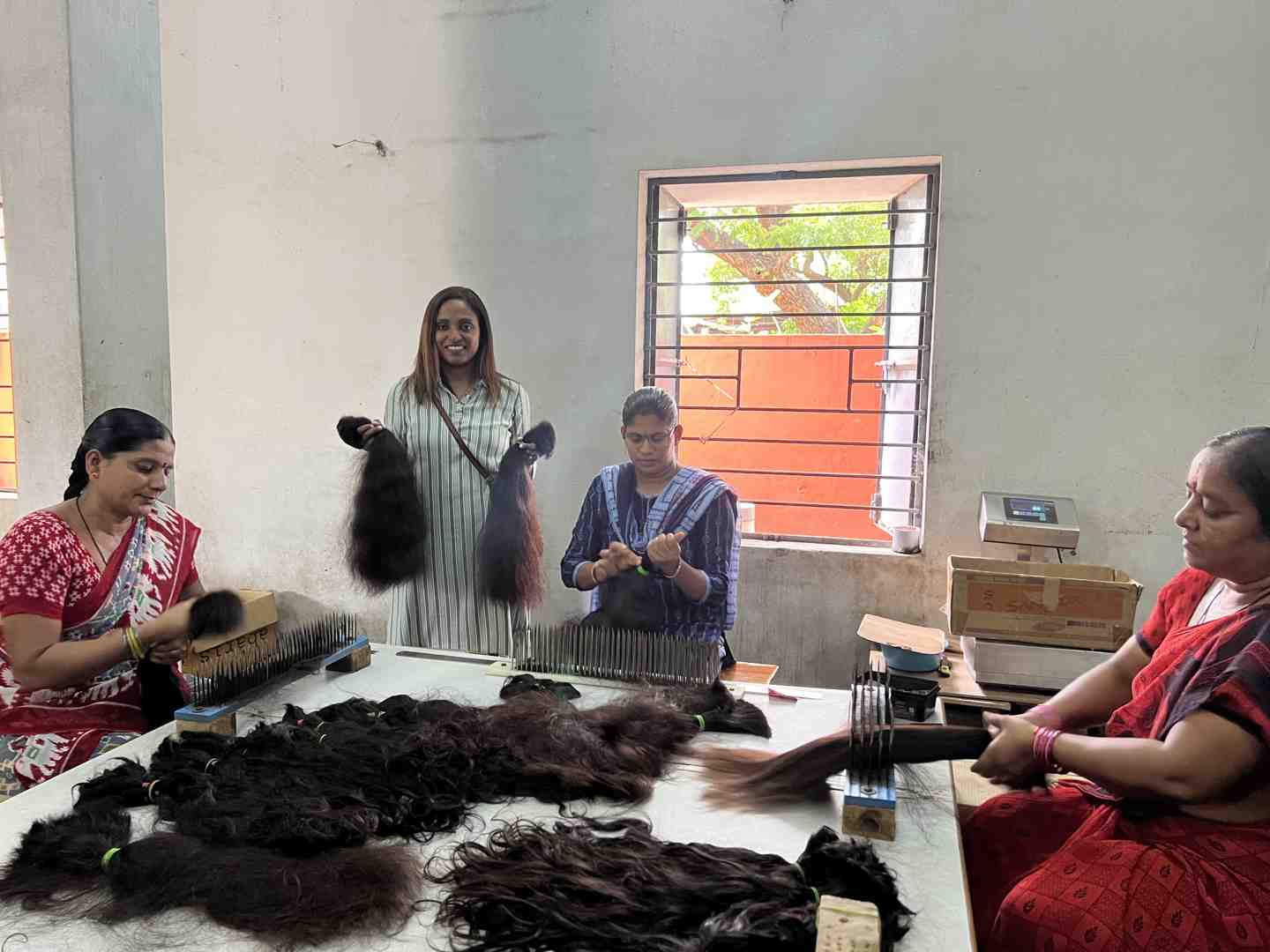
Frequently Asked Questions about Ethically Sourced Hair Extensions
What does "ethically sourced" actually guarantee?
When you see "ethically sourced" on hair extension packaging, it should mean one crucial thing: willing donors who gave consent. This isn't just a nice-to-have; it's fundamental. The big challenge? This term isn't regulated by any governing body. That means anyone can use it, even if their practices don't align with true ethical standards.
Do ethically sourced hair extensions cost more?
Yes, ethically sourced hair extensions typically cost 20-50% more than conventional alternatives - and there's a good reason for that. When donors receive living wages instead of pennies, when processing facilities maintain safe working conditions, and when quality control isn't rushed, costs naturally increase.
But here's what many people don't realize: ethical extensions often provide better long-term value. Because they're made from higher-quality hair that's been carefully processed, they can last 18-24 months with proper care. Compare that to cheap extensions that might need replacing every few months, and the math starts looking very different.
Think of it this way - when extensions seem unusually cheap, someone in the supply chain is paying the real cost. It might be the donor who received unfair compensation, the factory worker in unsafe conditions, or you when the extensions tangle and break after a few weeks.
How can stylists champion ethical sourcing?
Stylists have incredible power to drive change in the hair extension industry. You're the trusted advisor your clients turn to for guidance, and that influence can shape purchasing decisions across thousands of customers.
Client education becomes part of your service offering. Many customers want to make ethical choices but don't know how to identify them. When you guide clients toward ethically sourced hair extensions and explain the impact of their choices, you're building deeper relationships while supporting responsible practices.
Consider joining professional organizations that promote ethical standards in the beauty industry. Share knowledge with colleagues, attend continuing education courses focused on sustainability, and advocate for industry-wide improvements. Through Perfect Locks Pro, we connect stylists with a community of professionals who prioritize ethical practices and continuous learning.
Your voice matters. When enough stylists demand ethical sourcing, the entire industry responds.
Conclusion

Choosing ethically sourced hair extensions goes far beyond enhancing your appearance - it's about becoming part of a movement that transforms lives across the globe. Every purchase you make sends a powerful message about the kind of beauty industry you want to support.
Throughout this guide, we've explored how the $100 billion hair industry can either perpetuate exploitation or create genuine opportunities for economic empowerment. When you invest in ethically sourced hair extensions, you're directly supporting fair wages for donors, safe working conditions in processing facilities, and community development programs that build schools and hospitals.
The beauty of ethical sourcing lies in its ripple effects. A single purchase of temple hair might help fund a child's education in rural India. Choosing single-donor Remy wefts supports women who use their hair sales to start small businesses. Even opting for plant-based alternatives creates sustainable income for agricultural communities.
At Perfect Locks, we've made ethical sourcing our cornerstone because we've seen how it transforms both the quality of extensions and the lives of everyone involved. Our Perfect Locks Pro training programs continue spreading this knowledge to stylists across North America, teaching them not just how to work with premium extensions, but how to make choices that matter.
Why Ethically Sourced Hair is Important for Your Business demonstrates how ethical practices build deeper client relationships and stronger businesses. When your clients know their beauty choices support positive change, they become advocates for both your work and your values.
Yes, ethically sourced hair extensions often cost more upfront. But this price reflects something beautiful - it means real people received fair compensation, worked in safe conditions, and had their contributions valued properly. The superior quality that comes from ethical processing also means your investment lasts longer and performs better.
The future we're building together is one where looking beautiful and doing good go hand in hand. Every time you choose ethical extensions, you're voting for transparency, sustainability, and human dignity in the beauty industry. Your decision to choose ethically sourced hair extensions today helps ensure that future generations will inherit a beauty industry built on fairness, respect, and genuine care for everyone involved.




